NO POLLS, NO LOANS for river grabbers
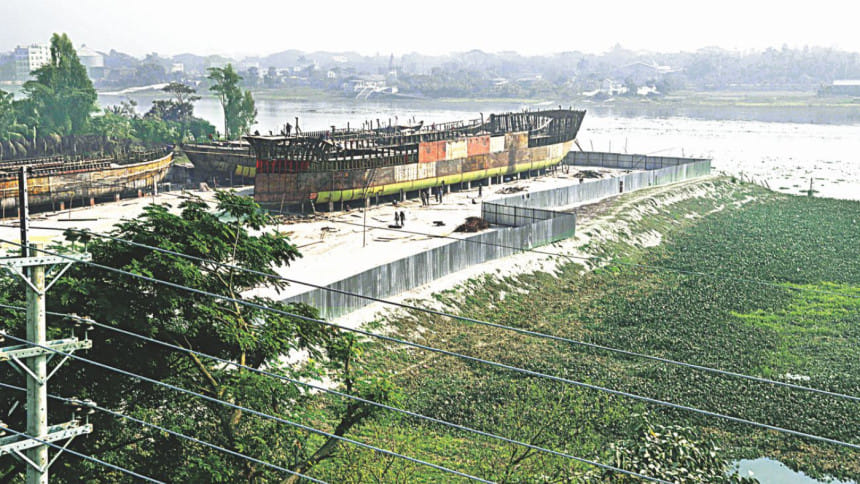
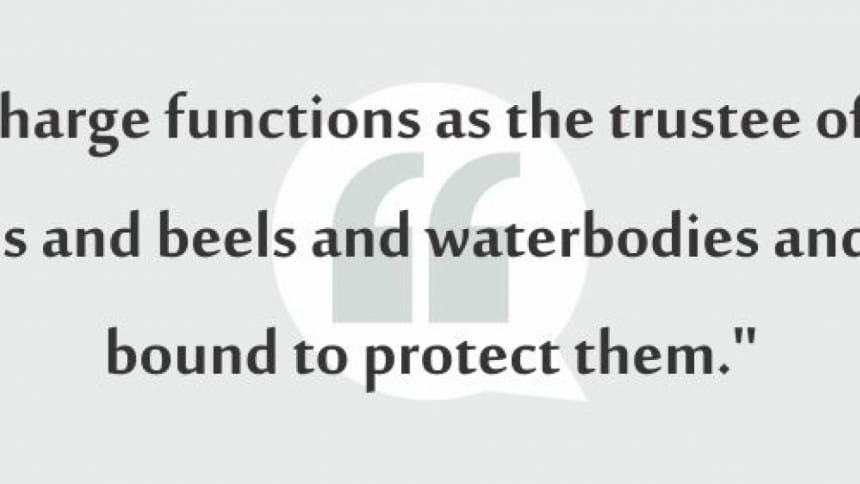
River encroachers cannot run in any elections or get bank loans, the High Court has ordered, in efforts to save rivers from greedy grabbers.
The HC also ordered the government to make a list of every grabber in the country and publish the list in the media to expose them to the public.
Read More: Kanamachhi has to stop
The grabbers include powerful individuals, businesses and, ironically, government offices. The Gazipur City Corporation is among the grabbers, a judicial inquiry has found.
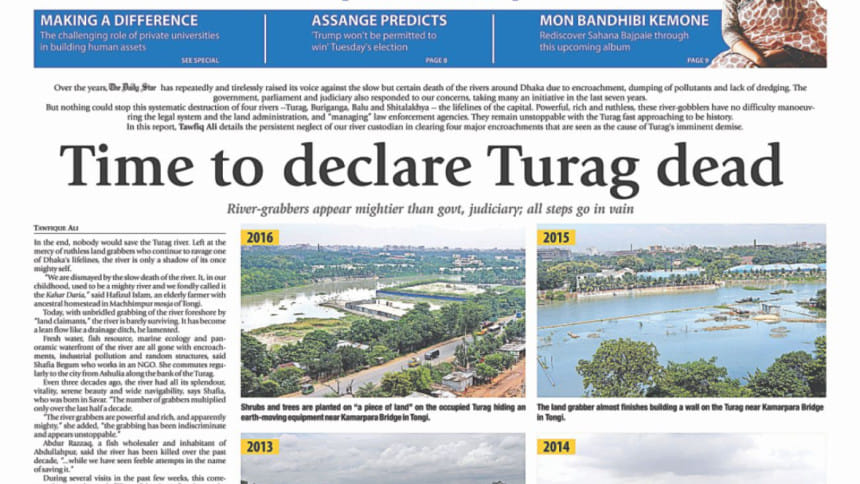
After the verdict, the government now will have to amend the National River Protection Commission (NRPC) Act 2013 with provisions for punishment and fine for river grabbing.
The current NRPC Act does not have provisions for punishment.
The government must report to the court in six months on its action in this regard.
The HC also declared the NRPC as the legal guardian of all rivers and act like their “parents”.
The landmark verdict comes when river grabbing by influential groups seems unstoppable. Often, grabbers return to steal river land soon after being evicted.
The HC delivered the judgment in response to a petition by Human Rights and Peace for Bangladesh. In its petition, the organisation cited a report published in The Daily Star on November 6, 2016, headlined “Time to Declare Turag Dead”.
The court yesterday thanked this paper for its reporting on how grabbers were killing the Turag and other rivers, and how the authorities were failing to save them.
“The Turag is a living entity,” the court said, and asked the authorities to remove all structures from it in 30 days.
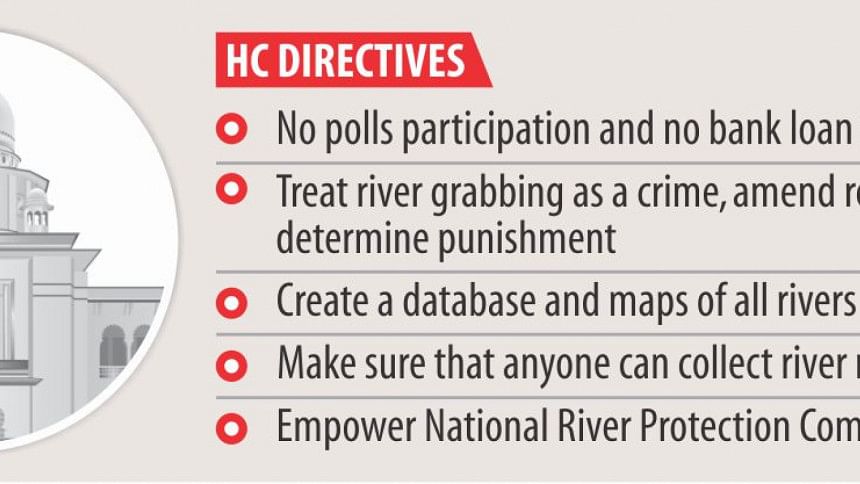
NO POLLS, NO LOANS
A large number of rivers in Bangladesh are in dire straits. Exact data is not available, but environmentalists and journalists working on the issue say most of the around 450 rivers in the country face serious threats because of ruthless grabbing and pollution.
To save them, the HC said, the state must act as the trustee of all rivers, hills, sea beaches, forests, canals and beels and other waterbodies while the NRPC will remain bound to protect them.
The court also asked the authorities to scrap the lease between the Gazipur district administration and Ha-Meem Group, which set up a washing plant on Turag land. The group is owned by top businessman AK Azad.
“If any person, whose name is included in the list of river land grabbing, he or she will be disqualified from contesting the union parishad, upazila, pourasava, city corporation and Jatiya Sangsad elections,” the court said, asking the Election Commission to take steps in this regard.
The Bangladesh Bank have been ordered to make sure no river grabbers get bank loans.
The bench of Justice Moyeenul Islam Chowdhury and Justice Md Ashraful Kamal asked the education ministry to take steps for holding an hour-long class every two months at all public and private academic institutions, including school, madrasa, college and university, to build awareness among students about the importance of rivers.
The industries ministry has been ordered to take measures for arranging an hour-long meeting every two months with factory workers across the country, also to create awareness.
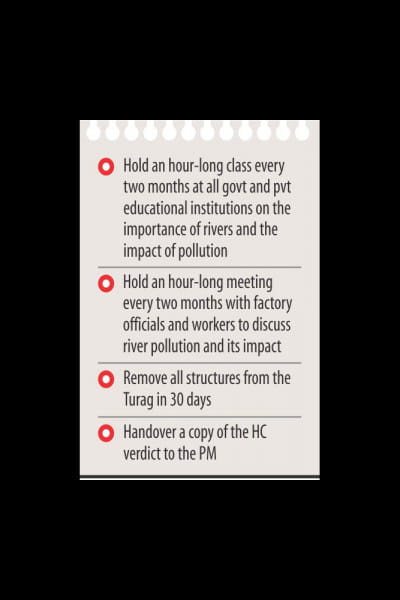
Advocate Manzill Murshid appeared for the petitioner.
The court started delivering the verdict on January 30. On the second day of the verdict on January 31, the court said that playing a game of blind man's buff (kanamachhi) over protection of rivers must stop.
The writ petition was filed on November 7, 2016.
Two days later, an HC bench directed the government to stop earth-filling, encroachment and construction along the Turag.
It also issued a rule upon the authorities to explain why their inaction in this regard should not be declared illegal.
In line with the court order, the chief judicial magistrate of Gazipur submitted a report before the HC in October 2017. The report said 30 structures were set up illegally along the river banks in Gazipur.
The judicial investigation also identified 36 individuals and organisations who grabbed Turag land, and submitted the list to the HC. The grabbers are Annon Tex, Dr Faras Uddin University, Cordod Land Developer and Captain Zakir Hossain, Protyasha Housing, Gazipur City Corporation, Truck-Covered van Drivers' Union, Central Medical College, Md Jahangir Zipper Factory, Zarina Textile, Sajid Washing of Ha-Meem Group, Biswa Ijtema, Shilpa Shamparkita Shikshayan, Tongi New Market (Masjid Market), Anwar Group, The Merchant Limited and Packaging Factory, Textile owner Iman Ali, Ripon Commissioner, Zaber and Zubair factories of Noman Group, Paradise Washing, Autul Purification, Yunus Member, Fazlu Miah, Shah Alam and Gong, Moslem Sarkar, Riaz Uddin, Abdul Hai, Lutfa Begum, Dolly Begum, Mintu D'Costa and others.
Later on December 13 that year, the HC directed the authorities to demolish the structures immediately.
A 2009 landmark HC judgment had detailed measures on how to recover the ailing rivers from land grabbers and save them from pollution.
At the time, the court ordered the administration to demarcate the boundary of five dying Dhaka rivers -- the Buriganga, Balu, Turag, Shitalakkhya and Dhaleshwari.
This apparently turned out to be the “death warrant” for the rivers.
Demarcation pillars were set up along the river banks during the lean flow of dry season waterline, excluding some 2,500 acres of foreshores and wetlands of the five rivers.

 For all latest news, follow The Daily Star's Google News channel.
For all latest news, follow The Daily Star's Google News channel. 



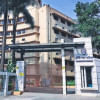
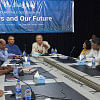



Comments